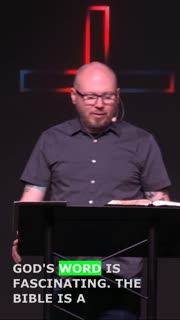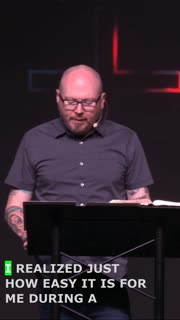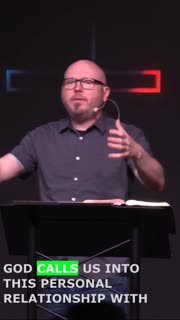Finding Strength and Deliverance in God's Presence
Devotional
Sermon Summary
Bible Study Guide
Sermon Clips
1) "God's Word is fascinating. The Bible is a fascinating book. It's got the life-giving, life-changing message of the gospel of Jesus Christ. And it's also got visions of creatures covered with eyeballs all over the place. There's parts of it where I don't know quite what to do with that. So we can come together as a body and go through those passages and figure it out together. And the thing is, all of it is divinely inspired. And all of it's in there for a reason. And all of it is a revelation of something about who God is and how we can know him. And there's never a dull moment in this book if you're paying attention. Amen?" [03:21] (51 seconds)
2) "Psalm 34 is for people who find themselves at the absolute low point in life, which is where David was, or find themselves between a rock, which in this case was King Saul, in a hard place, which was King Achish. It is for you when everything seems against you, which occasionally it does. So this psalm is for us. Without further ado, let's jump into the text and see what we find there. I will bless the Lord at all times. His praise shall continually be in my mouth. My soul makes its boast in the Lord. Let the humble hear and be glad. O magnify the Lord with me and let us exalt his name together." [11:05] (51 seconds)
3) "The angel of the Lord encamps around those who fear him, those who have a certain relationship with him, a certain attitude of heart toward him, a reverence for God, a humility before God, a trust in God. In response to that and as part of that relationship, God delivers them. In each of these verses, deliverance comes as part of that personal relationship. So the question for us is, how relational is our relationship with God? Because when you need deliverance, it's not enough just to believe in him." [14:47] (43 seconds)
4) "I realized just how easy it is for me during a normal week, when I'm not facing some big fear, I'm just going through my day-to-day life, not leaning into that relationship. It's pretty easy for my faith to become just kind of this set of beliefs that I'm carrying around with me, a collection of facts about God that I give assent to. I believe in God the Father. I believe in God the Son, the God the Holy Spirit. I believe in the gospel. I believe in the resurrection. I believe in the virgin birth, the authority of scripture. All these things that I believe, and don't get me wrong, these beliefs are essential. It's very, very important to have the correct doctrinal beliefs about who God is." [18:03] (54 seconds)
5) "I realized that if he had answered my prayer the way I wanted him to and given me the thing that I had specifically asked him for, I would have missed out on that. If he had removed my fear once and for all, I wouldn't have needed, I wouldn't have needed to, to pray the whole time. I wouldn't have had to be in that posture of dependence. And it reminds me of what the Apostle Paul said in the book of 2 Corinthians, where he was talking about his thorn in the flesh. We don't know exactly what the thorn in the flesh was. maybe a physical ailment of some kind. Paul had bad eyesight. Maybe he's praying that that's removed or something else, something that was bothering Paul." [24:32] (44 seconds)
6) "You might say, Josh, how can you say that God delivered you from fears if you're still feeling the fear? Which is a valid question. I mean, I asked myself that question when I got off the plane. Because yeah, the fear was still there. But this is the point. The fear did not overwhelm me. It did not overpower me. I did not have that panic attack. God got me through it. I would have preferred to go around that. But he got me through it. And what I realized is that being delivered from something doesn't necessarily mean that the presence of that thing is going to be removed it doesn't just go away it just means that the thing while being there and present with you is not going to overpower you it won't have victory over you you will have victory over it." [26:37] (63 seconds)
7) "God calls us into this personal relationship with him, the first component, and then we face a difficult situation, something that is frightening to us. We assume the posture of dependence on him in those situations, that's the second component. He delivers us from all our fears. In response to which, we begin to praise him and talk about how awesome he is, in response to which, other people hear about the Lord and they're drawn into a personal relationship with him so that they can begin to magnify the Lord with us and exalt his name together. That's sort of this beautiful cycle that the Lord calls us into." [33:57] (55 seconds)
Ask a question about this sermon
2) "Psalm 34 is for people who find themselves at the absolute low point in life, which is where David was, or find themselves between a rock, which in this case was King Saul, in a hard place, which was King Achish. It is for you when everything seems against you, which occasionally it does. So this psalm is for us. Without further ado, let's jump into the text and see what we find there. I will bless the Lord at all times. His praise shall continually be in my mouth. My soul makes its boast in the Lord. Let the humble hear and be glad. O magnify the Lord with me and let us exalt his name together." [11:05] (51 seconds)
3) "The angel of the Lord encamps around those who fear him, those who have a certain relationship with him, a certain attitude of heart toward him, a reverence for God, a humility before God, a trust in God. In response to that and as part of that relationship, God delivers them. In each of these verses, deliverance comes as part of that personal relationship. So the question for us is, how relational is our relationship with God? Because when you need deliverance, it's not enough just to believe in him." [14:47] (43 seconds)
4) "I realized just how easy it is for me during a normal week, when I'm not facing some big fear, I'm just going through my day-to-day life, not leaning into that relationship. It's pretty easy for my faith to become just kind of this set of beliefs that I'm carrying around with me, a collection of facts about God that I give assent to. I believe in God the Father. I believe in God the Son, the God the Holy Spirit. I believe in the gospel. I believe in the resurrection. I believe in the virgin birth, the authority of scripture. All these things that I believe, and don't get me wrong, these beliefs are essential. It's very, very important to have the correct doctrinal beliefs about who God is." [18:03] (54 seconds)
5) "I realized that if he had answered my prayer the way I wanted him to and given me the thing that I had specifically asked him for, I would have missed out on that. If he had removed my fear once and for all, I wouldn't have needed, I wouldn't have needed to, to pray the whole time. I wouldn't have had to be in that posture of dependence. And it reminds me of what the Apostle Paul said in the book of 2 Corinthians, where he was talking about his thorn in the flesh. We don't know exactly what the thorn in the flesh was. maybe a physical ailment of some kind. Paul had bad eyesight. Maybe he's praying that that's removed or something else, something that was bothering Paul." [24:32] (44 seconds)
6) "You might say, Josh, how can you say that God delivered you from fears if you're still feeling the fear? Which is a valid question. I mean, I asked myself that question when I got off the plane. Because yeah, the fear was still there. But this is the point. The fear did not overwhelm me. It did not overpower me. I did not have that panic attack. God got me through it. I would have preferred to go around that. But he got me through it. And what I realized is that being delivered from something doesn't necessarily mean that the presence of that thing is going to be removed it doesn't just go away it just means that the thing while being there and present with you is not going to overpower you it won't have victory over you you will have victory over it." [26:37] (63 seconds)
7) "God calls us into this personal relationship with him, the first component, and then we face a difficult situation, something that is frightening to us. We assume the posture of dependence on him in those situations, that's the second component. He delivers us from all our fears. In response to which, we begin to praise him and talk about how awesome he is, in response to which, other people hear about the Lord and they're drawn into a personal relationship with him so that they can begin to magnify the Lord with us and exalt his name together. That's sort of this beautiful cycle that the Lord calls us into." [33:57] (55 seconds)







